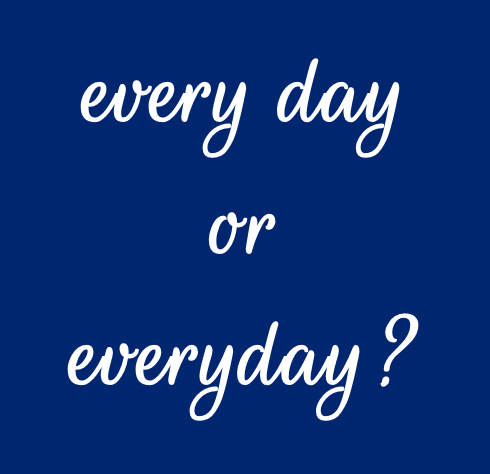
Almost every day, I see someone use “everyday” in a sentence when they mean “every day.” Mixing up “everyday” and “every day” is one of the most common grammatical errors.
Newsflash: “Every day” does NOT mean the same thing as “everyday”! If you find yourself writing either one of them, stop, breathe, and read the next section of this article.
Every Day vs. Everyday
What do these words mean?
“Every day” (2 words) means “happening or occurring each day.”
The compound word “everyday” is an adjective meaning “of or pertaining to every day”; “commonplace” or “regular.”
Given these definitions, let’s look at some examples of proper use:
- I walk to work every day.
- I wear my everyday shoes to walk to work; I change to my Manolo Blahniks upon arrival.
- It has snowed every day for the past week.
- Snow is an everyday event during Wisconsin winters.
- I wish I could eat chocolate all day every day!
- Some chocolate sure would spice up this everyday chili.
A Trick to Remember Whether to Use Everyday or Every Day
How will you remember the difference between “every day” and “everyday”? My simple trick is to add the word “single” between “every” and “day;” if it makes sense to insert this word, then the words must be separated by a space in place of the word “single.” If inserting “single” does not work, you’re in the land of the adjective “everyday.” Let’s try it with the examples here:
- I walk to work every single day. (Makes sense so it’s 2 words)
- I wear my every single day shoes to walk to work. (Doesn’t make sense so it’s 1 word)
- It has snowed every single day for the past week. (Makes sense so it’s 2 words)
- Snow is an every single day event during Wisconsin winters. (Doesn’t make sense so it’s 1 word)
I’ll leave you to test the chocolate chili examples. I promise they work.
Everyday Examples I See Every Day
Now let’s take a look at some common ways people misuse the word “everyday.” I’ll use 3 examples from LinkedIn.
- In an email I received from a LinkedIn marketing expert, the following phrase appeared: “Great discussions and tips are taking place everyday with over 10,000 members.”There are actually two problems with this sentence. One is that tips do not take place, only discussions do; you would not say “Great tips are taking place.” The other is that everyday is the adjective meaning commonplace. The author meant that discussions are taking place every single day. Therefore the correct usage would be “every day” (2 words).
- A LinkedIn discussion title came across one of my groups: “Fast way to make money everyday.” Again, this writer means “every single day” so the correct way to express his idea would be “Fast way to make money every day.”
- Here’s an example from a comment on one of my postings: “You learn something new everyday.” Do you see the error? I hope you are now highly trained in the distinction between “every day” and “everyday”! Please pass this wisdom on to someone who will benefit from it today and every day.
Do you have other writing or grammar questions? Contact The Essay Expert for help with choosing exactly the right words.











Thank you for the reminder. I’ve caught my mistake when I used the word “every day.” It helps to have writing references near by when you write.
You’re welcome Rebecca. You raised another question too: Is it “near by” or “nearby”? I would use the word “nearby” without a space.
– Brenda
I like your solution, Krishna! Indeed, “daily” can mean either “every day” or “everyday.” I don’t think we’ll completely eliminate the use of “every day” and “everyday,” but if anyone is confused, using “daily” might be a safe bet!
I loved your article. It is easy to forget those simple lessons from childhood; and also, to forget to proofread what we write before we send it out. Especially with the time constraints most of us are under.
I wonder, (and maybe you have a theory), what will happen to written and spoken languages now that tweets and texts have entered most of our everday lives?
Thank you Melody! I have read conflicting articles about the effect of texting on students. Apparently, one study found that frequent texting makes students better spellers because they learn to sound things out phonetically. Another article reported on the inability of students to use proper grammar due to the laziness that accompanies electronic communications. The one thing I know for sure is that language is rapidly evolving and will continue to do so! I welcome new words (like “texting” for instance, which my spell check does not recognize) and sometimes there is a fine line between incorrect language and evolving language.
Thanks Nick. Great suggestion. I went ahead and added the plugin!
Thanks Nick. Google +1 share is now available!
How about “Everyday is a beautiful day” Or is it Every day?
Hi Jennifer, that would be “Every day is a beautiful day.” If you can insert “single” between Every and day then it’s two words!
I love this post. Thank you Essay Expert. I now know how to use everyday and every day. 🙂 Now what about someday? lol
I have a question on spelling back door vs backdoor when used in the following sentence: He entered the house thru the front door and exited
thru the backdoor / or exited thru the back door.
Which one is the correct spelling?
Backdoor is an adjective or a computer term. In the sentence you proposed, the correct spelling is “back door.”
How about using ‘Get up’ and ‘Stand up’ in everyday grammar?
Well you used “everyday” correctly! Not sure what your question is about using “Get up” and “Stand up”? Both of these sound like commands (and good song lyrics).
I love learning from you. I’m just finishing up my book, and learning more about writing every day. I do not have a good education but that should not stop anyone from writing.
Thanks so much Ang! You are reminding me of why I do what I do!
It’s just over 60 years since Buddy Holly wrote and recorded the song “Everyday” it has since then been covered by countless other singers. I’ve never seen any comment on the title being incorrect (It’s EVERYDAY on record/s – including cover versions) In my opinion in the context it’s used, throughout the song, it should be “Every Day”.
Do you agree?
Thanks for your comment, David. Yes I absolutely agree!! Ditto for all the covers (James Taylor, Fiona Apple, etc.) that also misspell it!
Dear Essay Expert,
I’ve write down a sentence on our magazine draft like this, “I’m learning something new every day!” is this wrong? My supervisor said “I’m learning something new everyday” is correct. Please let me know which is the correct answer and why. T_T
Dear Essay Expert,
I’ve write down a sentence like this, “I’m learning something new every day!”.
But, My supervisor said, “I’m learning something new everyday!” is correct.
Please let me know which is correct answer and why…
Hi Karl, I would recommend showing my article to your supervisor. You are correct!
Thank you! Brenda. 🙂